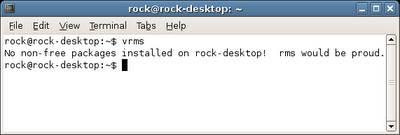Novell and "Big Mike"
"Novell didn't feel bad about breaking their agreement with the volunteers, as long as what they did was only unethical and repugnant, not against the law."Read it in full here.
to make cyberspace a better place
"Novell didn't feel bad about breaking their agreement with the volunteers, as long as what they did was only unethical and repugnant, not against the law."Read it in full here.
Labels: gpl3, linux, microsoft novell agreement
"There is no system but GNU, and Linux is one of its kernels."And thanks to vrms, I have confirmation of my holy stature. I am a saint in The Church of Emacs. Let it be known that my ranking is (tied for) second, behind only the mighty St. IGNUcius himself.

"I think that students need to be taught about choices and options. I think that teaching students about the philosophy behind free software and having them read some of the things RMS says is a great idea. [But,] I think they should also be exposed to the other side as well."Stating that students should be taught the "other side" of software licensing is like saying "students should be taught censorship as well as free speech". Of course, students should be aware that speech is unjustly censored in this world (obviously not what Alfred is implying when he says "exposed") - just as students should read proprietary EULAs. But to present this fact as a reasonable alternative to free speech would be absurd.
"The other thing I think is important is that tools, especially tools for teaching, should be selected for how well they do the job and not for how well they promote a philosophy."Again, Alfred sounds very reasonable. But what is implied through such a view? Implied in this view is that the study of technology is simply about the creation of end products, not about the study of the tool itself. Software is not simply a tool "for teaching". It is equally a tool for learning and developing. Of course, there will be students who only tackle technology from Alfred's viewpoint - and that is fine. But it is obvious that the right approach to technological education is to make sure of this - that those who study and develop tools are studying and developing the tools used by society. This is efficient, participatory, and cooperative. Having to tell a bright individual to hack on the GIMP while her classmates all use Photoshop is an obvious sign of societal inefficiency, exclusivity, and competition.